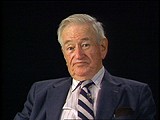You searched for: Warsaw ghetto
<< Previous | Displaying results 321-330 of 344 for "Warsaw ghetto" | Next >>
-
Abraham Lewent recalls how, while ill with typhoid, he persuaded the Skarzysko doctor that he was fit to work
Oral HistoryLike other Jews, the Lewents were confined to the Warsaw ghetto. In 1942, as Abraham hid in a crawl space, the Germans seized his mother and sisters in a raid. They perished. He was deployed for forced labor nearby, but escaped to return to his father in the ghetto. In 1943, the two were deported to Majdanek, where Abraham's father died. Abraham later was sent to Skarzysko, Buchenwald, Schlieben, Bisingen, and Dachau. US troops liberated Abraham as the Germans evacuated prisoners.
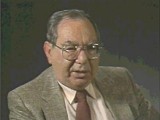
-
Ludmilla Page describes conditions in Oskar Schindler's munitions factory in Brünnlitz
Oral HistoryLudmilla was born to an assimilated Jewish family in Kishinev, Romania. She and her mother, a physician, were living in Poland when the Germans invaded on September 1, 1939. They were taken to Krakow. Ludmilla was forced to live in the Krakow ghetto; her mother was sent to the Warsaw ghetto. Ludmilla worked in a factory at the Plaszow labor camp for a businessman who was a friend of the German industrialist Oskar Schindler. In October 1944, Schindler attempted to save some Jewish workers by relocating them…
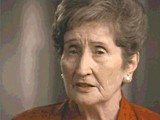
-
Abraham Lewent describes the moments following his liberation from a death march from the Dachau camp
Oral HistoryLike many other Jews, the Lewents were confined to the Warsaw ghetto. In 1942, as Abraham hid in a crawl space, the Germans seized his mother and sisters in a raid. They perished. He was deployed for forced labor nearby, but escaped to return to his father in the ghetto. In 1943, the two were deported to Majdanek, where Abraham's father died. Abraham later was sent to Skarzysko, Buchenwald, Schlieben, Bisingen, and Dachau. US troops liberated Abraham as the Germans evacuated prisoners.
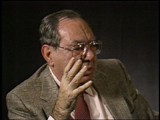
-
Doris Greenberg describes arrival procedures at Ravensbrück
Oral HistoryThe Germans invaded Poland in 1939 and established a ghetto in Warsaw in 1940. After her parents were deported, Doris hid with her sister and other relatives. Doris's sister and an uncle were killed, and she learned that her parents had been killed. Her grandmother committed suicide. Doris was smuggled out of the ghetto and lived as a non-Jewish maid and cook, but was ultimately deported to the Ravensbrück camp. Upon arrival there, Doris and her friend Pepi contemplated swallowing poison, but decided…
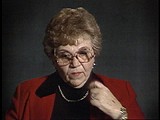
-
Channa Morgensztern
ID CardChanna and her husband and five children lived 35 miles east of Warsaw in the small predominantly Jewish town of Kaluszyn. Channa's husband, Jankel, was employed as a clerk in the town hall. After Channa's children reached school age, she helped her mother run a newspaper kiosk in town. 1933-39: Germany has invaded Poland, and Channa's hopes that Kaluszyn wouldn't be in the line of fire have been shattered. First, a German plane flew over their town and dropped a bomb on people waiting in line outside a…
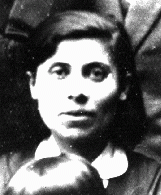
-
Isachar Herszenhorn (Irving Horn)
ID CardIsachar was born to a Jewish family in the Polish city of Radom, approximately 75 miles south of Warsaw. The city was the center of Poland's leather-tanning industry. Isachar's father worked as a salesman for a nearby tanning factory. His father was a successful salesman and the family lived comfortably. 1933-39: During registration for Isachar's first-grade class in 1934, a Jewish boy was pushed down the stairs. When his mother confronted the principal about the incident, all he said was that the boy had…
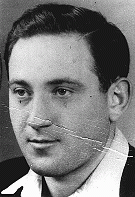
-
Rivka Rzondzinski
ID CardThe mother of six children, Rivka lived 35 miles east of Warsaw in the small predominantly Jewish town of Kaluszyn. The Rzondzinski family was very religious. When Rivka's husband, Fiszel, died in the early 1930s, she and her oldest daughter, Channa, opened a newspaper kiosk near the Kaluszyn railroad station. 1933-39: When Germany invaded Poland several days ago, Rivka's daughter Raizel's husband and her two sons fled eastward to the USSR with other Jewish men. They were afraid that the Germans would…
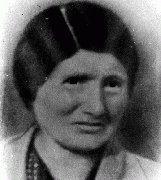
-
Josel Gerszonowicz
ID CardThe oldest of eight children, Josel was born in Miechow, a small town in south central Poland. His father was a machinist and locksmith. As a boy, Josel spent long days learning Hebrew in the Jewish school and taking general subjects at the public school. He was 13 years old when he left school to work in his father's shop. 1933-39: Josel met his wife, Esther, through a matchmaker, and they settled in nearby Dzialoszyce, a town with a Jewish community of about 7,000, and a beautiful synagogue that had…
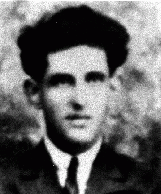
-
Chaie Sura Kisielnicki
ID CardChaie Sura was the youngest of three children born to Jewish parents living 35 miles east of Warsaw in the small, predominantly Jewish town of Kaluszyn. Her father owned a wholesale grocery store, a restaurant and a gas station, which were located together on the busy main road. The Kisielnicki family lived in rooms in the same building as their business. 1933-39: When Germany invaded Poland several days ago, Chaie Sura's father and brothers fled eastward towards the USSR with other Jewish men who were…
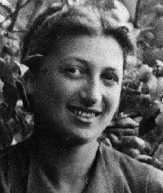
-
Henry J. Kellermann describes the reactions of defendants during the Nuremberg Trial
Oral HistoryHenry received a Doctor of Law (J.D.) degree from the University of Berlin in 1937. Sponsored by the rabbi of the Baltimore Hebrew congregation, Henry immigrated to the United States in the same year. In 1945, the Office of Strategic Services (OSS) assigned him to prepare pre-trial briefs for the International Military Tribunal held in Nuremberg, Germany. He interrogated a number of witnesses and defendants. After the war, he held various diplomatic posts.
